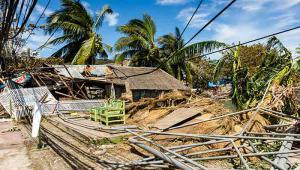Last week’s decision by the government of Barbados to suspend payments on its foreign debt was the latest response to a crisis spreading across many countries, from Ghana and Mozambique to Gambia and Mongolia.
Average government external debt payments have increased 60% in the last three years, and are at the highest level since 2004. The IMF reports that of 67 impoverished countries it assesses, 30 are in default on their debts or at high risk of being so, up from 15 in 2013.
This emerging crisis is the result of several policies and shocks over the last decade.
Ten years ago, just before the financial crisis, debt in the developing world was largely on a downward trend. Thirty-six of the most impoverished countries benefited from the cancellation of $130 billion of debt through the Heavily Indebted Poor Countries initiative. Many others benefited from rising prices for commodities, still the main export for many countries.
The global financial crisis was the first shock. Some small countries like Barbados took a big hit through loss of tourism revenue. Then, following the crisis, interest rates were kept low in order to try and stimulate growth in the US and Europe. This led creditor nations to look to increase lending to impoverished countries where they can get higher returns. In extreme cases, such as Mozambique and Republic of Congo, lenders and government officials have hidden loans from parliaments and the public, preventing those loans from being held to account.
Foreign loans to developing country governments almost doubled from $200 billion per year in 2008 to $390 billion in 2014.
Then, in mid-2014, commodity prices fell. Commodities vary wildly in price and often provide few jobs. When prices are high, speculators are keen to offer loans. But when they fall, the result can be economic collapse.
Furthermore, governments are still failing to collect enough money in tax to fund basic needs and investments. There have been recent positive moves on tackling tax avoidance and evasion, but without adequate tax revenues, governments are left dependent on debt to fund sustainable development goals.
The response to the new round of debt crises has been very similar to previous developing world debt crises and the Eurozone crisis in the 2010s.
More loans are being given by the likes of the IMF and World Bank, enabling interest to be paid, while debts increase. This actively incentivizes reckless lending by paying lenders off, and so helps to ensure that the cycle of crises will continue.
Instead, lenders should be made to pay at least some of the price for reckless lending, with the costs of crises shared between borrower and lender.
In addition, governments and lenders need to be made more accountable, through regulations to strengthen transparency around lending. Government debts are taken out in the name of the people of a country, so no money should be lent if those people do not know the debt is being created.
New rules for responsible lending and an end the system of bailouts for lenders will nip this crisis in the bud, and greatly reduce the chances of future global debt crises.








